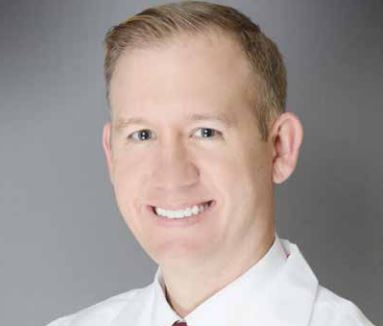Neal Jackson, M.D.
Ensuring the Best ENT Care
 Americans visit their otolaryngologists (ear, nose and throat specialists) 20 million times annually according to the American Academy of Otolaryngology-Head and Neck Surgery. While most people are familiar with common ENT ailments such as ear infections, tinnitus (ringing in the ears) and sleep apnea, ENT doctors treat many other conditions.
Americans visit their otolaryngologists (ear, nose and throat specialists) 20 million times annually according to the American Academy of Otolaryngology-Head and Neck Surgery. While most people are familiar with common ENT ailments such as ear infections, tinnitus (ringing in the ears) and sleep apnea, ENT doctors treat many other conditions.
As Dr. Neal Jackson, a board-certified otolaryngologist explains, “The most common reasons for a visit to the ENT doctor are problems with hearing, such as earaches or ear infections, nasal congestion and chronic sinusitis. At the Tulane ENT/Otolaryngological Clinic, we treat a wide range of ENT problems, including infections, tumors and nerve pathway disorders affecting hearing and balance, as well as perform surgery on the face, neck or ear to treat or remove cysts or tumors.”
Hearing Loss
The National Institute on Deafness and Other Communication Disorders estimates that 36 million Americans have some form of hearing loss and many of them are unaware that they have a problem. Because not all hearing problems are major or obvious, patients may not recognize the telltale signs of decreased hearing capacity unless they have their hearing tested. “With a simple, non-invasive hearing screening, a doctor or audiologist can access how well you hear different tones and sounds,” Dr. Jackson says. “If you fail the screening, we will schedule a hearing exam to determine the degree of your hearing loss and your options. The treatment for hearing loss can range from deciding to live with a mild hearing loss or prescribing an antibiotic to treat an ear infection to the surgical correction of a hole in the ear drum or removal of an acoustic neuroma — a benign tumor that develops on the balance vestibular or cochlear nerves leading from your inner ear to the brain.”
Technological Advances in Hearing
To address the longterm damages in the inner ear, ENT doctors rely on cochlear implants to restore hearing. Although for years, hearing aids have been a popular solution among hearing loss patients, they were unfortunately not powerful enough for some levels of hearing loss. However, with recent innovations in ENT technology, these implants have become increasingly available to patients.
Dr. Jackson, who is also the Tulane Medical Center and VAMC Director of Cochlear Implant Program explains, “Until a few years ago, cochlear implants were only available for patients who were completely deaf or those with profound hearing loss. Now we can offer them to patients who have some natural residual hearing.”
With the addition of mobile applications, like ReSound, patients can now adjust the settings of their hearing aids on their mobile phones. “The technology proves to be advantageous for older patients who want to address the deterioration of their hearing and lead a life with sound,” Dr. Jackson says. Diseases and disorders of the ear, nose, throat and related bodily structures can occur in people of any age or gender. Although adults aged between 45 and 64 years old are the most common visitors of otolaryngology clinics, at least 20 percent of patients are children under the age of 15 years. Because otolaryngologists see patients of all ages and do not limit their practice to any one portion of the head and neck, an additional five to eight years of intensive, post-graduate training is required beyond medical school for this specialty.
Fellowship-trained in neurotology, Dr. Jackson completed a 5-year residency training in otolaryngology/head and neck surgery at LSU Health Sciences Center-New Orleans followed by a 2-year fellowship in neurotology, otology and skull base surgery at the prestigious Michigan Ear Institute. Dr. Jackson performs a wide range of ear surgeries including cochlear implantation, chronic ear surgery, stapes surgery and skull base tumor surgery.
On why he became an otolaryngologist: “My maternal grandfather, ‘Papa,’ served in World War II as a battalion surgeon when he was only 27 years old,” Dr. Jackson says. “After the war, he excelled at many things, as a farmer, pilot, banker and entrepreneur, and he was greatly admired. When I was a child, he told me, ‘The best thing you can do with your time is to provide a service to your fellow man,’ and those words have guided me to a career in medicine.”
On family life: “I met my wife, Abby, while completing my residency at LSU,” Dr. Jackson says. “We moved to Michigan for my fellowship and married in Traverse City last summer. Although we always knew we would return to Louisiana, we named our dog ‘Traverse’ because we think so fondly of our time there.”
On why he loves working at Tulane: “I am so grateful to be working with a great ENT team, as well as my skull base colleague, Dr. Peter Amenta — a neurosurgeon who specializes in cerebrovascular and skull base surgery and endovascular neurosurgery,” Dr. Jackson says. “At Tulane, we stay current with cutting-edge research, and, because of that, we work together on complex cases, which makes my job challenging and interesting.”
Neal Jackson, M.D.
Tulane ENT/Otolaryngological Clinic
1415 Tulane Ave.
(504) 988-5263
[email protected]
MEDICAL SCHOOL: University of Texas Health Science Center in San Antonio
RESIDENCY: LSU Health Sciences Center-New Orleans, Otolaryngology/Head and Neck Surgery
FELLOWSHIP: Michigan Ear Institute, Neurotology, Otology and Skull Base Surgery
